A recent press interview with Srila Prabhupada at Iskcon Headquarters in Los Angeles.
Q. Your Grace, what is the basis of your teaching?
Srila Prabhupada: The basis of this teaching is Bhagavad-gita As It Is; I have already published my book, Bhagavad-gita As It Is. This book is not new; it is very old, at least 5,000 years old, and it is very widely read all over the world. In your country, I have seen that there are more than twenty-five different English editions of Bhagavad-gita. And similarly, it is very well known in Germany, England and Japan—everywhere.
This book teaches Krsna consciousness because the speaker is Lord Krsna and the subject matter is our relationship with God. Krsna means “all-attractive,” and it is the perfect name of God. Unless the Supreme Person is all-attractive, He cannot be God. God cannot be the Hindus’ God, or the Christians’ God, or the Jews’ or Mohammedans’ God. No! God is for everyone, and He is all-attractive. He is fully opulent, full or perfect in knowledge, perfect in beauty, perfect in renunciation, perfect in fame and perfect in strength; in this way He is all-attractive. So, we must know our relationship with God. That is the first issue of this book, Bhagavad-gita. After understanding what our relationship with God is, we can work accordingly. For example, when you are a citizen of America you have a particular relationship with the state, and you are expected to work according to that relationship; then you are a good, law-abiding citizen, and the state gives you all prosperity and protection. Similarly, if we know our relationship with God, whom we call Krsna, then we can act accordingly.
At the present moment, some of us are disclaiming God, saying that there is no God. Some people have little understanding of God; they know that God is great, but they do not try to understand their actual relationship with Him. They are not very serious. Actually, in this way, people are avoiding their eternal relationship with God and therefore not acting properly, and that is the cause of all miseries and all problems. For example, if you do not know the state laws, then you do not act properly; you are always a criminal. If you do not know how to drive on the right, and you drive on the left, even though you may think, “It is all driving, what difference does it make, right or left?” as soon as you drive left, you become a criminal. Similarly, because we do not know our relationship with God, we act wrongly, and therefore, under the laws of God, we become more and more criminal; and thus our problems are increasing. In spite of advancement of education, science and the accessories of civilization, such as nice dresses and cars, no one trusts anyone. Do you see? Everywhere you go, even at a gentleman’s house, there is always suspicion: “Beware of the Dog.” “No trespassing Allowed.” An individual is suspicious of another individual, a nation is suspicious of another nation, a community is suspicious of another community; so how can we have peace and prosperity? Suspicion is animalistic; a dog is suspicious of another dog. As soon as he finds another dog, he immediately begins to bark: bow wow wow. Is that human civilization? What is the mistake of human civilization? The mistake of our present society is that people have forgotten their relationship with God. Here is a scientific statement of your relationship with God. By understanding it, just like by understanding your citizenship, you can act properly, and that is peaceful life.
Besides that, this life, the present life, is not all. We have life after death—that is a fact. We are continuously alive throughout the stages of the present life. Every one of us was a child, and that was a life. Then we became boys, then youths, and now we are becoming old. And, generally, when this body becomes useless, we have to take another one. This is the law of nature. Unfortunately, people do not believe in the next life, although in everyday affairs they experience that they are eternal. Anyone can remember the days of his childhood, the days of his youth, his boyhood, and still he is alive. That means that he is continuously present although his body has changed in different ways. So it is a fact that even after changing this body, you’ll have another body. You are sitting in this room now, but if you vacate this room, that does not mean that you are dead—you have gone into some other room. This understanding of birth and death is a great science, and yet people are neglecting it because they have no information about it. There are so many departments in a university: technological, medical, engineering, etc. But where is the department to know and understand what this life is, what God is, and what our relationship is? So, this is not a very good civilization.
There is life after this life. There are also different grades of life. Authoritative books state that there are 8,400,000 different grades of life. There are 900,000 species of aquatic life, 2,000,000 species of plants and trees, 1,100,000 species of reptiles, 1,000,000 species of bird life, 3,000,000 species of beasts and 400,000 human species. And out of 400,000 different kinds of human bodies, the civilized body is a great boon. Upon attaining such a body we can make further spiritual progress by transferring to other planets where the standard of living is many, many thousands of times better than on this planet. But in Bhagavad-gita As It Is, there is information that wherever you go within this material universe, whether you remain on this planet or go to the moon or the sun or any of the millions and trillions of planets, there is still suffering.
The highest planetary system is called Brahmaloka. There the duration of life is very, very long. 4,300,000 solar years is one age, one yuga. A thousand yugas equal twelve hours on Brahmaloka. Similarly, the inhabitants there live for one hundred such years. The duration of life is very, very great, just as our life is in comparison with the ant’s life. The human being has a hundred years’ age, so, to the ant, his life may be very astonishing. “Oh! How can one live such a great length of time?” But still, the four factors of birth, death, old age and disease are everywhere, no matter how elevated the planet is. We may be astonished by hearing of the long duration of life on Brahmaloka, but actually death is still there. So, from Bhagavad-gita we understand the version of Krsna, or God, that even if you go to the highest planetary system, you have to come back again. In this way, all living entities are rotating from one planet to another and from one species of life to another.
But we don’t want this, actually. If I offered to give you a youthful, eternal body, full of knowledge, would you not like to have it? No one likes old age, no one likes death, and no one likes to take birth again, to enter into the womb of a mother and live there ten months; but what is the solution? Is there any solution known to the scientists? No scientist can say, “Ah well, all right, we shall stop death; we shall stop disease.” They can manufacture medicine to counteract disease, but they cannot manufacture anything which will stop it. You can fight against death very vigorously, but you cannot stop death. There are the problems, but there is no education in modern civilization about how to stop death, disease, old age and birth and how to attain eternal, blissful life.
This Krsna consciousness movement, although it appears to be a new movement in your country, is known to the world. I’ve already published my magazines and my books dealing with these problems, and if people take advantage of this movement and try to understand these books, they will be benefited greatly. That is the basic principle of my teaching.
Q. Your Grace, how does one attain Krsna consciousness?
Srila Prabhupada: There are several stages in attainment of Krsna consciousness. The first stage is faith, or inquisitiveness—just as you have come to me now, this is the first stage. Due to some inquisitiveness or some faith in the people who are teaching Krsna consciousness, who have said that it is very helpful, one comes to the first stage. One should be inquisitive and have a little faith, or a little respect for Krsna consciousness: “It is very nice. They are speaking and working.” This is the first stage.
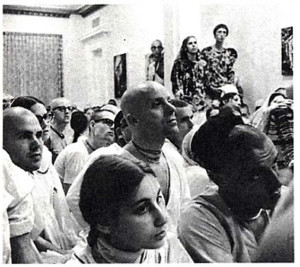 If you find that Krsna consciousness is interesting, then the second stage is to associate with us, to understand more. We have class in the morning daily, but for the public, we are holding classes in the evening from 7 to 9 p.m. at our temple, discussing this book, holding kirtana, distributing prasadam. There is no labor—you simply come and hear songs, dance, take offered food, hear philosophy and think, and then you go home. We don’t ask anyone to press his nose, to hold his head down or to exercise in a certain way. It is better that people automatically want to dance with us. Although dancing is labor, they like it. So, the next stage is to associate with us, to understand more and more. This is the second stage The first stage is to have faith and respect, and the second stage is association.
If you find that Krsna consciousness is interesting, then the second stage is to associate with us, to understand more. We have class in the morning daily, but for the public, we are holding classes in the evening from 7 to 9 p.m. at our temple, discussing this book, holding kirtana, distributing prasadam. There is no labor—you simply come and hear songs, dance, take offered food, hear philosophy and think, and then you go home. We don’t ask anyone to press his nose, to hold his head down or to exercise in a certain way. It is better that people automatically want to dance with us. Although dancing is labor, they like it. So, the next stage is to associate with us, to understand more and more. This is the second stage The first stage is to have faith and respect, and the second stage is association.
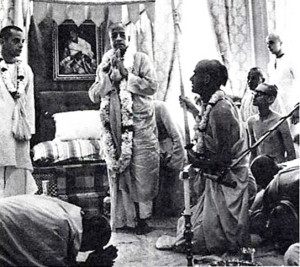 If by association, one becomes serious about becoming a regular student, that is the third stage. That is called initiation. In that stage students are guided by me; they follow strictly. For the initiated students there are four principles: we don’t allow students to take any foodstuffs which are not offered to the Deity. So we offer foodstuffs to the Deity: grains, fruits, flowers and milk products, but no meat, no eggs, or anything of that sort. Perhaps you have participated in our love feast on Sundays. Yes?
If by association, one becomes serious about becoming a regular student, that is the third stage. That is called initiation. In that stage students are guided by me; they follow strictly. For the initiated students there are four principles: we don’t allow students to take any foodstuffs which are not offered to the Deity. So we offer foodstuffs to the Deity: grains, fruits, flowers and milk products, but no meat, no eggs, or anything of that sort. Perhaps you have participated in our love feast on Sundays. Yes?
Comment From Audience: It was excellent!
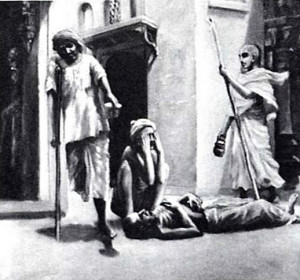 Srila Prabhupada: [Laughing] They like it! There are many hundreds of preparations, at least 300, including many varieties of grains, milk products and fruits. We don’t kill animals, but we make very nice preparations, and everyone likes them. It is one of the restrictions that we cannot eat anything which is not offered to Krsna. Another restriction is no intoxication: no smoking, no drinking even no tea or coffee. These American boys are accustomed to all these habits by nature, but they are giving them up. In our temple there is no tea drinking, no coffee, no cigarette smoking, nothing of the sort. This is a restriction. And another restriction is that we cannot take part in gambling or some unnecessary sport because we have to utilize our time. Our time is very short. Do not think that because I am old, I am nearing death, and you are not nearing death because you are young—who knows? You may die before me. There is no certainty, and so the principle is that, because this human form of life is so important for perfecting one’s self in Krsna consciousness, one should not waste even a minute. Therefore, we don’t allow unnecessary sporting, which is simply a waste of time. The rules are: no illicit sex life, no meat eating, no intoxication and no gambling.
Srila Prabhupada: [Laughing] They like it! There are many hundreds of preparations, at least 300, including many varieties of grains, milk products and fruits. We don’t kill animals, but we make very nice preparations, and everyone likes them. It is one of the restrictions that we cannot eat anything which is not offered to Krsna. Another restriction is no intoxication: no smoking, no drinking even no tea or coffee. These American boys are accustomed to all these habits by nature, but they are giving them up. In our temple there is no tea drinking, no coffee, no cigarette smoking, nothing of the sort. This is a restriction. And another restriction is that we cannot take part in gambling or some unnecessary sport because we have to utilize our time. Our time is very short. Do not think that because I am old, I am nearing death, and you are not nearing death because you are young—who knows? You may die before me. There is no certainty, and so the principle is that, because this human form of life is so important for perfecting one’s self in Krsna consciousness, one should not waste even a minute. Therefore, we don’t allow unnecessary sporting, which is simply a waste of time. The rules are: no illicit sex life, no meat eating, no intoxication and no gambling.
Every student has to follow these four principles, otherwise I don’t initiate him. I don’t take cheap students, who want to do whatever they like and pay me some money for some mantra that will make them “become God.” I don’t say that. I don’t bluff like that. I have not come to your country for money, but I have come to your country to give you something sublime—not to take from you, not to exploit you, but to give you something sublime. So initiation is the third stage. If you are situated in the third stage nicely, if you follow the regulative principles under my direction, then the fourth stage automatically comes. After this third stage, the fourth, fifth, sixth, seventh and eighth stages automatically come, by gradual development. So, in the third stage, if you follow the regulative principles and chant according to the prescribed number, then all your misapprehensions will leave automatically.
What are these misapprehensions? The first misapprehension is to think, “I am this body.” Everyone is under the concept of the body. But I am not the body; that is a fact. The body is changing. There are many examples. A very common example is this: Suppose a man is dead; now everyone is crying, and if we ask, “Why are you crying?” they will say, “Oh, my son is dead!” I can say, “Your son is lying here; why are you saying that he is dead?” “Oh no, he is dead; he is gone. His body is lying there!” Therefore he is different from the body. Immediately people understand. They say, “No, he is gone, his body is left lying there.” So you understand how, at the time of death, the man is different from the body! But during his lifetime he was taking care of his body only. Why didn’t he take care of himself? Because he did not know himself. You see? This is a misapprehension. In this way there are so many misapprehensions. We are situated on a platform of misgivings only, misunderstanding our present conditional life. For example, since I am different from this body, how can I claim that America is my country? I call myself an American because accidentally this body was born in the land of America, but, if I am not this body, how am I American? This is another misapprehension. Then, I call you my son, you call him your son, but who is he? He is a product of your body. So if you are not your body, how is he your son? In this way, you go on, and as soon as you understand that you are not your body, you will find that you belong to none of this material world. You are free.
This is called Brahman realization, spiritual realization. When you understand that you are not the body, you do not belong to this country, or to a certain family or society. Some philosophers try to make these things void by a negating process, but actually their existence is real; I exist. I am existing in misunderstanding, but that does not mean that I do not exist. I am not void. I exist within this apartment with myself. But simply to understand that I am not this apartment is not perfect knowledge. What is my position? What am I actually? At the present moment I am conscious of this body, of this country, of this society, of this family, but when I perfectly understand that I am not any of these, then my consciousness also changes because at the present moment my consciousness is absorbed in all these things. As soon as I understand that I am not any of these, then my consciousness must change, but it does not stop. If I am in misunderstanding and I come to the right understanding, that does not mean that my understanding has stopped. Rather, my understanding becomes purified. That means that if I am not one thing, then I am something else. And that “something else” is what you have forgotten. What is it? That “something else” is Krsna—Krsna consciousness.
So, when you are freed from this illusory consciousness, if you are situated in Krsna consciousness, then you lose attachment to the body, the society, the country and so many things in relationship with the body. When you come to the right point, then you understand that you are Krsna’s. Then your attachment is for Krsna and it increases because you transfer the previous attachment to Him, just as a child who is attached to playing later transfers his attachment to studying. That does not mean that he gives up the attachment for playing. That attachment is not lost. Attachment must be there, but it is transferred or purified.
Krsna consciousness means purified consciousness, real consciousness. And the next stage, after one is freed from misgivings, is attachment for the real identity, then greater attachment, and then ecstasy. That is when I come nearer to God, because I am God’s. In the beginning I told you that we had forgotten our relationship with God, but when you are released from misgivings, you come to the platform of increasing attachment for God. The love is here also; but instead of loving God, we are now loving dog. Love is there, but when you are free from misgivings, you transfer your love from dog to God. These are different stages to come to in attaining Krsna consciousness. So, if you follow conscientiously in these six stages of development, you come to Krsna consciousness.
Q. Your Grace, does Krsna consciousness bring in karmic action as part of your belief?
Srila Prabhupada: Yes, Krsna conscious activities apparently seem to produce karma. We must understand what the difference is between karma and bhakti. We are using this tape recorder and this microphone, and if you go to a politician you will find the same paraphernalia. I am speaking, and he is also speaking. So apparently we are both the same. But this is bhakti, and that is karma. Then what is the difference between bhakti and karma? In karma, when you do something, for whatever you do, there is a result, and you receive the result. Suppose you do some business. The result may be one million dollars profit, and so you take it. And the result may be one million dollars loss; you take it. This is karma. You act on your own account, and you take the result. But our activity is for Krsna, so when we act, if there is profit, it is Krsna’s, and if there is loss, it is also Krsna’s. We are unaffected.
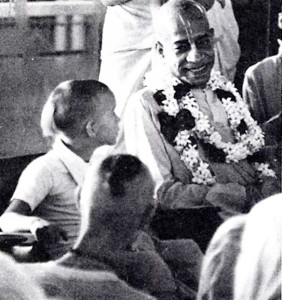 We are preaching this Krsna consciousness, and so, if someone joins, he is Krsna’s; he is not mine. These boys are serving me, not for my sense gratification, but to develop Krsna consciousness. Similarly, we go to serve a master; we serve the master for the sense gratification of the particular person, and therefore he pays us. So we do not serve that master; we serve that payment. And what is that payment? Sense gratification. Therefore, he serves his sense gratification. Karma is serving one’s sense gratification, and bhakti is serving Krsna’s sense gratification. Krsna will be satisfied by bhakti. We work in that way, so it is not karma. And as soon as a worker says, “Oh, I will get this money and satisfy my senses,” that produces karma. He becomes subject to the result, be it good or bad; but when you work for Krsna, it is all good, and there is no question of bad. All good goes to the All-Good. I am simply His eternal servant, that’s all.
We are preaching this Krsna consciousness, and so, if someone joins, he is Krsna’s; he is not mine. These boys are serving me, not for my sense gratification, but to develop Krsna consciousness. Similarly, we go to serve a master; we serve the master for the sense gratification of the particular person, and therefore he pays us. So we do not serve that master; we serve that payment. And what is that payment? Sense gratification. Therefore, he serves his sense gratification. Karma is serving one’s sense gratification, and bhakti is serving Krsna’s sense gratification. Krsna will be satisfied by bhakti. We work in that way, so it is not karma. And as soon as a worker says, “Oh, I will get this money and satisfy my senses,” that produces karma. He becomes subject to the result, be it good or bad; but when you work for Krsna, it is all good, and there is no question of bad. All good goes to the All-Good. I am simply His eternal servant, that’s all.
Another example is that the finger takes up foodstuff and gives to the stomach; when the stomach is satisfied, the finger is satisfied automatically. It does not need food separately. But the karmis are trying to independently enjoy themselves, just as if the finger were to take a nice cake and think, “Why should I give it to the stomach?” The finger cannot eat, and the cake simply becomes stale; that’s all. So we are spoiling our energy without Krsna consciousness, and that’s why we are being subjected to the laws of transmigration from one species of life to another. We are simply spoiling our time and energy. If you take to Krsna consciousness, that is proper utilization of your energy given by God. When I am healthy, the finger is also healthy. What, then, is the duty of the healthy finger? To serve the body. Similarly, we received this energy from Krsna, from God, so if we utilize this energy for Krsna, that is proper utilization. If we utilize the energy for our sense gratification, then we are misusing it.
Anyone who is not in Krsna consciousness is spoiling his time, wasting his life and subjecting himself to so many laws of nature. These matters are very clearly explained in this Bhagavad-gita As It Is. This is the preliminary study of Krsna consciousness, and if one studies this book seriously, he goes on to other books. I have the Srimad-Bhagavatam, which is also Krsna conscious philosophy. But the Srimad-Bhagavatam project is very great. It will have to be finished in sixty volumes. About ten to twelve volumes are already finished, and I am working on this. It is a great subject matter for study. People should take interest in it, it is not anything trifling. People should come to us to understand. We have literature, we have philosophy—everything. This Krsna consciousness movement is not a blind, imposing dogma. Everyone who actually wants to give some service to society, to humanity, must study this philosophy. And we are prepared to meet anyone—scientists, philosophers, poets, thoughtful men—and give the answers to all their questions.
Our method is very simple: We call everyone, even the child, to sit down and chant Hare Krsna. And there will be gradually realization. And if anyone wants to understand this philosophy through knowledge, through books, through philosophy and logic, we are also prepared. But for the mass of people we give the simple method, Hare Krsna. Chant Hare Krsna, Hare Krsna, Krsna Krsna, Hare Hare. All these boys are not philosophers, nor are they very highly learned, but they are developing knowledge simply by chanting. Krsna consciousness is so sublime. It is for the greatest scholar, and it is for the innocent boy; therefore it is universal.

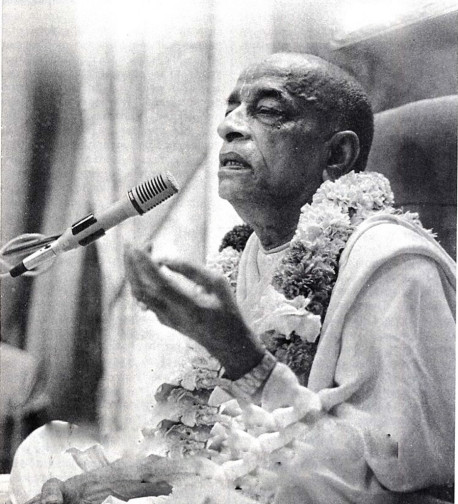

Leave a Reply